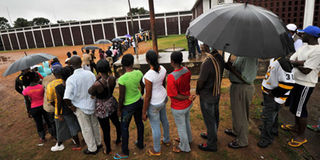Liberians brave downpour to vote as Nobel winner seeks re-election

People queue up to cast their vote for Presidential, Senatorial and Legislative elections on October 11, 2011 at a polling station in Monrovia. Around 1.8 million Liberians were eligible to vote in only the second election since the end of a 14-year civil war and seen as a litmus test of the west African nation's fragile democracy. AFP PHOTO / ISSOUF SANOGO
MONROVIA, Tuesday
Liberians braved pouring rain today to vote in the country’s second post-war polls as President Ellen Johnson Sirleaf sought another term just days after jointly winning the Nobel Peace Prize.
United Nations peacekeepers and police fanned out across polling stations in the seaside capital Monrovia and elsewhere as hundreds queued up to vote in presidential, senatorial and legislative elections.
Around 1.8 million people are eligible to vote in the second election since the end of a 14-year civil war, seen as a litmus test for the west African nation’s fragile democracy.
African Union observer mission chief Speciosa Wangira-Kazibwe - a former Ugandan vice-president - said voting was proceeding “very well” despite a thunderous downpour which lasted about an hour before clearing.
“The whole world has their eyes on Liberia and the number of observers that are here, it is really phenomenal,” she told AFP outside a polling station.
She said the turnout “puts a big challenge on the leaders that are being elected today. When you look in the eyes of these Liberians they are saying we are giving you our vote, and you will lead us to prosperity.”
While voting proceeded smoothly, reports from correspondents and on Twitter feeds, said it was going very slowly in several counties as many voters had to be educated on how to cast their ballots.
In the commercial Red Light district of Monrovia, about 700 people lined patiently as others were taught how to vote.
“Since 5:00am I have been here at the polls. The process here is very very slow. Too many entering in here don’t have an idea of voting,” construction engineer Roosevelt Binda, 49, told AFP.
In Nimba County, some 250 miles from the capital, those who had finished voting helped others.
“Me I don’t know book, so what they explained on the paper to stick on the walls, I don’t understand it,” Kou Gono, 65 said.
Poll worker Ruth Saye said she had been given “the green light from our bosses to find someone who will help these people how to cast their votes.”
The vote is the first since Sirleaf became Africa’s first woman president in 2005, shortly after the country emerged from a savage war which left some 250,000 people dead.
The 72-year-old grandmother, dressed in jeans and wearing a cap, waited in line for half an hour in the oppressive heat in her home village Fee Fee Town about 60 kilometres outside Monrovia, before being fast-tracked to the elderly queue.
“I’m very pleased to see the manner in which the Liberian people are voting, they’ve come out in numbers - they are very disciplined, they are very patient, standing in line, there is no confusion — they are exercising their right of choice and we’re just all happy,” she said.
Sirleaf is facing a stiff challenge from main opposition candidate Winston Tubman, 70, who has crowd-pleasing football star George Weah as his running mate.
As he cast his vote in the capital, the Harvard-trained lawyer who has drawn massive crowds to his rallies promised to work towards reconciliation if elected.
“I am sure of winning the first round because of the huge support throughout the country. I have asked all our supporters not to do violence.”
Eight years after the end of a war fought by numerous rebel factions, some of whom armed drugged-up child soldiers, country is rebuilding slowly.
(AFP)




